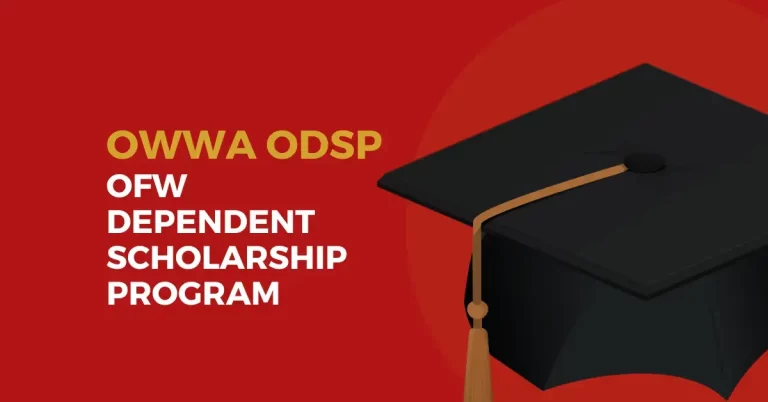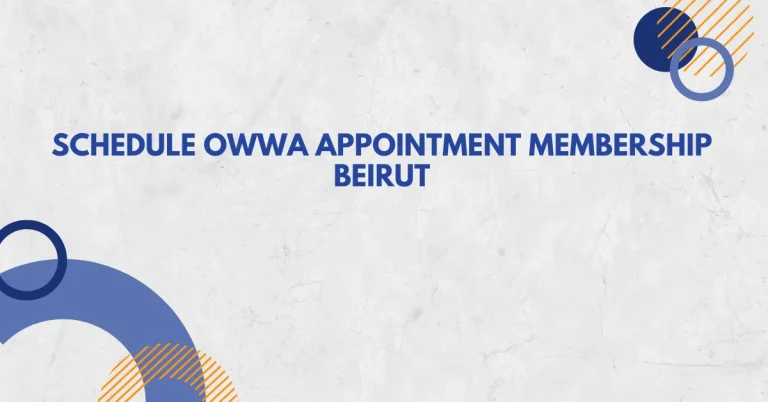PHP 20,000 Cash Grant: OWWA Balik Pinas! Balik Hanapbuhay! Program
After spending several years working overseas as Overseas Filipino Workers (OFWs), many of our esteemed “Modern Heroes” face significant challenges when reintegrating into the society they left behind. Fortunately, the Overseas Workers Welfare Administration (OWWA) has developed the Balik Pinas! Balik Hanapbuhay! Program (BPBH) to provide support, protection, and immediate relief to repatriated OFWs. This initiative offers a one-time cash aid to assist them in starting a new business or enhancing an existing one.
OWWA Balik Pinas! Balik Hanapbuhay! Program: PHP 20,000 Cash Grant for Repatriated Individuals
OWWA offers a range of grants, assistance, and aid to its active members, including the Balik Pinas! Balik Hanapbuhay (BPBH) Program. This program is designed to support repatriated individuals who require financial assistance in expanding their existing businesses or starting new ventures. If you find yourself in this situation, you can explore the opportunities offered by the OWWA BPBH Program, which provides a cash grant of PHP 20,000.00 to eligible participants. This grant aims to provide a boost to your entrepreneurial pursuits and help you get back on your feet.
Additionally, we have compiled a comprehensive guide that outlines all the essential details about OWWA’s Balik Pinas! Balik Hanapbuhay! Program. This guide covers everything from the necessary requirements to the application procedures, including where to apply and what to expect throughout the application process. By reading this guide, you will gain valuable insights into how you can access this livelihood assistance program and take advantage of its benefits. Start exploring the opportunities offered by the BPBH Program today
What is Balik Pinas! Balik Hanapbuhay! Program (BPBH)?
The Balik Pinas! Balik Hanapbuhay! Program (BPBH) is an initiative by the Overseas Workers Welfare Administration (OWWA) in the Philippines. It is designed to assist distressed or displaced overseas Filipino workers (OFWs) in reintegrating into the economic and livelihood sectors of society after being repatriated for various reasons.
The program specifically targets both active and inactive OWWA members who have been repatriated under certain circumstances. These circumstances include being displaced due to political chaos, war, or economic problems; being victimized by illegal recruiters or human traffickers; experiencing maltreatment or verbal/sexual abuse; being repatriated due to the employer’s personal financial problems; or being distressed and currently under the care of Migrant Workers and Overseas Filipinos Resource Centers.
The implementation of the Balik Pinas! Balik Hanapbuhay! Program is handled by the OWWA Regional Welfare Offices. Cash assistance is provided directly to the repatriated distressed OFW members. The disbursement of the cash assistance takes place from Mondays through Fridays, between 8:00 AM and 5:00 PM.
What can OWWA members get from the BPBH Program?
To qualify for the Balik Pinas! Balik Hanapbuhay! Program (BPBH) and avail its livelihood support and assistance programs, repatriated OFWs need to meet certain qualifications and requirements. Here are the general guidelines:
- Status as a repatriated OFW: The program is specifically designed for OFWs who have been repatriated back to the Philippines.
- Membership with OWWA: Applicants must be active or inactive members of the Overseas Workers Welfare Administration (OWWA). The OWWA membership status will determine the amount of cash assistance they are eligible for.
- Completion of entrepreneurship development training (EEDT): Repatriated OFWs are required to undergo entrepreneurship development training facilitated by OWWA. This training aims to equip them with the necessary knowledge and skills to start or manage a livelihood venture.
- Submission of necessary documents: Applicants will be required to provide certain documents, which may include but are not limited to:
- Valid passport or any proof of overseas employment
- Proof of OWWA membership (OWWA membership ID or OWWA E-card)
- Proof of repatriation (flight details, certification from the Philippine Embassy or Consulate)
- Training certificate for entrepreneurship development training
Qualifications
The BPBH (Balik Pinas! Balik Hanapbuhay!) program is designed to provide assistance and livelihood opportunities to overseas Filipino workers (OFWs) who have been displaced from their jobs due to various reasons. To determine if you are eligible to start an application for the BPBH program, you would need to consider the following qualifications:
- If you are an OFW OWWA (Overseas Workers Welfare Administration) member who had to stop working because your employer is facing financial trouble, you may apply for the BPBH program.
- The program is open to OFWs who have been displaced by war, economic problems, or political chaos. If any of these circumstances have caused you to lose your job abroad, you are eligible to apply for the BPBH program.
- The BPBH program also extends its assistance to OFWs who have been victims of human trafficking, illegal recruitment, maltreatment, and sexual abuse while working abroad. If you have experienced any of these unfortunate situations, you may apply for the program.
- Additionally, distressed or displaced OFWs who are currently waiting to be repatriated back to the Philippines can also apply for livelihood assistance under the BPBH program.
Requirements
Here’s the list of requirements that you will need to prepare before you head on to learning how the application process for the BPBH Program goes:
For Active Members:
- OWWA Membership Records
- OFW Verification Sheet issued by OWWA
- Completed Application Form with Personal Undertaking (Sariling Salaysay) stating that the cash assistance will be used solely for livelihood activities of the OFW.
- Proof of repatriation or return to the Philippines, which can include:
- The first page of the passport showing the last departure and arrival in the Philippines, along with a visa stamp from the foreign country.
- Airline ticket.
- Boarding pass.
- Travel documents.
- Proof of displacement, including:
- Termination letter from the employer.
- Referral letter or certification from POLO (Philippine Overseas Labor Office) or the Philippine Embassy.
- SENA (Single Entry Approach) Complaint.
- Request for repatriation.
- Medical records (if the OFW was medically displaced or repatriated).
- Proof of Residency (Barangay Certificate/Clearance).
For Inactive Members:
It seems like you’re looking for a list of documents that can serve as proof of OWWA (Overseas Workers Welfare Administration) membership. While I can provide you with a general list of documents commonly used for OWWA-related purposes, please note that specific requirements may vary, and it’s always best to consult with the OWWA or the relevant authorities for the most accurate and up-to-date information. Here is a list of documents that can potentially serve as proof of OWWA membership:
- OWWA Membership Records: This typically includes your OWWA membership number or ID card. You can request this document from the OWWA office where you registered as a member.
- OFW Verification Sheet issued by OWWA: This sheet confirms your OWWA membership status and can be obtained from the OWWA office or through their online portal.
- Proof of repatriation or return to the Philippines: This can include any of the following documents:
- The first page of your passport showing the last departure and arrival stamps in the Philippines, as well as a visa stamp from the country you were working in.
- Airline tickets or boarding passes indicating your return to the Philippines.
- Any other relevant travel documents that demonstrate your return.
- Proof of displacement:
- Termination letter from your employer, indicating the end of your employment.
- Referral letter or certification from POLO (Philippine Overseas Labor Office) or the Philippine Embassy, verifying your displacement.
- SENA (Single Entry Approach) complaint, if you filed one due to displacement.
- Request for repatriation, if applicable.
- Medical Records: If you were medically displaced or repatriated, providing medical records or documents that indicate the need for repatriation can support your claim.
- Proof of Residency: A Barangay Certificate or Clearance can serve as proof of your residence in a specific barangay or locality.
For Undocumented OFWs:
To fulfill the requirements, you will need to provide the following documents:
- Two valid government IDs, which can include your passport. Make sure both IDs are current and not expired.
- Proof of repatriation or return to the Philippines. This can be demonstrated by providing any of the following:a. The first page of your passport showing the last departure and arrival stamps in the Philippines, along with a visa stamp from the foreign country you were in. b. An airline ticket indicating your return to the Philippines. c. Boarding pass(es) from your flight(s) back to the Philippines. d. Any other relevant travel documents that show your return to the Philippines.
- Proof of displacement, which can be substantiated by submitting any of the following:a. A termination letter from your employer indicating the end of your employment abroad. b. A referral letter or certification from the Philippine Overseas Labor Office (POLO) or Philippine Embassy that acknowledges your displacement. c. A complaint filed with the Single Entry Approach (SENA) if applicable. d. A request for repatriation document, if you have one. e. Medical records, if you were medically displaced or repatriated as an Overseas Filipino Worker (OFW).
- Proof of residency, such as a Barangay Certificate or Clearance, confirming your residential address in the Philippines.
Other requirements:
- One (1) 2×2 ID picture
- Duly filled-up Simple Business Plan
- Sketch of home and business site
- Certificate of Training Attended
- Entrepreneurial Development Training
- Skills Training
How to Apply for Balik Pinas! Program by OWWA
To access the benefits of the BPBH program, please follow these steps:
- Go to the OWWA Regional Welfare Office (RWO) website at appointment.owwa.gov.ph or use the mobile app to set up an appointment. Choose the OWWA RWO that covers your permanent address.
- Select the program you are applying for and choose the OWWA RWO nearest to your permanent address.
- Pick a preferred appointment date for your visit.
- Provide your personal information as requested during the appointment setup process.
- Wait for the Appointment Confirmation, which will be sent to you.
- On the confirmed appointment date, go to the OWWA Regional Welfare Office (RWO) as scheduled.
- Obtain a queuing number or join the line for assistance.
- Present and submit all the required documentary requirements to the Reintegration Unit Staff.
- Attend the Enterprise Development Training (EDT) session at the OWWA RWO, as scheduled.
- Once you have completed the EDT session and received the EDT completion certificate, submit the application forms and fulfill the remaining requirements.
- Prepare for the Business Site Inspection conducted by the OWWA RWO. If your application is approved, the RWO will schedule the release date of the cash assistance. You will receive a notice of approval and claiming.
- On the designated release date, visit the OWWA RWO and claim the financial assistance if your application has been approved.
Get to Know Marilou Oliver, a BPBH Beneficiary from Region IV-B
Meet Marilou Oliver, a hardworking overseas Filipino worker (OFW) originally from Region IV-B (MIMAROPA) who had been employed at a restaurant in Qatar. Unfortunately, when the COVID-19 pandemic hit, she found herself without a job and displaced from her place of work. With limited options available, Marilou made the difficult decision to accept the repatriation offer and return to the Philippines.
Upon her return, Marilou was fortunate to be one of the repatriated OFWs who received support from the government’s Balik Pinas! Balik Hanapbuhay Program. She was granted a livelihood assistance package amounting to Php 20,000.00, which helped her in starting her own business venture. In addition to this, she also received financial assistance worth Php 10,000.00 through the Department of Labor and Employment-AKAP (DOLE-AKAP) program, providing her with additional support during this challenging period.
With the financial aid she received, Marilou seized the opportunity to pursue her entrepreneurial dreams. She utilized the funds wisely and established her own salon. Through her hard work, determination, and the skills she gained during her time as an OFW, Marilou transformed into a successful businesswoman and a proud owner of her salon.
Marilou’s inspiring journey showcases the resilience and adaptability of Filipinos in the face of adversity. Despite the setbacks brought about by the pandemic, she was able to turn her life around and create a sustainable livelihood for herself. Her story serves as an inspiration to many others who may find themselves in similar circumstances, proving that with determination and support, it is possible to overcome challenges and achieve success.
Frequently Asked Questions
Here are some of the most common questions asked about the Balik Pinas! Balik Hanapbuhay! Program of the OWWA for its member OFW.
1. What are the inclusions of the Balik Pinas! Balik Hanapbuhay! Livelihood Assistance Program?
Aside from the cash assistance ranging from Php 5,000.00 to Php 20,000.00, the Balik Pinas! Balik Hanapbuhay! (BPBH) Program package also includes:
- Techno-Skills or Entrepreneurial Training
- Starter Kits/ Goods
- Services that can help the beneficiaries to start a livelihood project through self-employment immediately
2. Can I avail the Balik Pinas! Balik Hanapbuhay! Program benefits more than once?
No. Just like most other OWWA programs, you can only avail of the BPBH Livelihood Assistance Program once.
3. Is there a time limit to when we can avail of the Balik Pinas! Balik Hanapbuhay! Program?
Yes. If you are an OWWA member OFW and you are interested in availing the benefits of the BPBH Livelihood Assistance Program, then you are encouraged to do so within one (1) year after your return to the country.
4. Who is not eligible for the BPBH Livelihood Assistance Program?
Those who are not eligible for the Balik Pinas! Balik Hanapbuhay! (BPBH) Program are the OWWA Members-OFW who finished their employment contracts. Note that this program is only for repatriated, distressed, or displaced OFWs who were unable to complete their contracts due to uncontrollable reasons.
5. When we went to the nearest OWWA Regional Welfare Office (RWO), they sent us back home and advised us to set an appointment first. How can we inquire or arrange an appointment?
If you need to set an appointment, you can do so by going to the OWWA website and accessing the scheduler or by using the OWWA Mobile Application. If you already have an account on the OWWA Mobile App, you may proceed to the steps in inquiring or setting an appointment, otherwise, you have to sign up for an account on the OWWA Mobile App first.
Setting an OWWA Appointment via the OWWA Mobile App
If you need to learn how to set an appointment using your OWWA Mobile App, then this is what you do:
- Install the Mobile Application on your mobile phones. (Google PlayStore for Android Users or App Store for Apple Users)
- Open your OWWA Mobile App, and you will see the tab for E-Services. Click that tab.
- After opening the E-Services tab, you will see a tab for Program Offers.
- Click the Overseas Filipino Workers – Enterprise Development.
- Click the Inquire button.
- Select your respective region.
- After confirming your selected region, an alert will appear, notifying you that an email for your copy was sent to you.
- Check your email account, and from there on, wait for the instructions you will follow.
- You can also email back to ask when and what time you can go to your OWWA RWO.
6. Is the cash assistance from the Balik Pinas! Balik Hanapbuhay! (BPBH) Livelihood Assistance Program a loan? How soon would I need to pay it back?
No. It is not a loan. It is a one-time livelihood assistance given by OWWA to repatriated distressed OFWs as support in helping them reintegrate back home. Note that because this is not a loan, there is no need to pay them back to OWWA.
Summary
The BPBH (Balik Pinas! Balik Hanapbuhay!) program is indeed a valuable initiative by OWWA (Overseas Workers Welfare Administration) that provides livelihood assistance to repatriated or distressed overseas Filipino workers (OFWs).PHP 20,000 Cash Grant: OWWA Balik Pinas! Balik Hanapbuhay! Program This program aims to support OFWs in reintegrating into society and starting their own businesses.
One of the main benefits of the BPBH program is the cash assistance it provides. This financial support can be used by OFWs to either start a new business or expand their existing one. The program recognizes that entrepreneurship can be a viable path for OFWs to regain stability and improve their livelihoods upon returning to their hometowns.
In addition to the cash aid, the BPBH program also offers training and skills development opportunities. Participants receive basic training in business management and entrepreneurial development, which equips them with the necessary knowledge and skills to successfully run their businesses. This aspect of the program is crucial as it helps OFWs transition from being employees abroad to becoming self-employed entrepreneurs in their own communities.
Another notable aspect of the BPBH program is its accessibility. It is open to both active and inactive OWWA members, as long as they meet the program’s qualifications and provide the required documentary requirements. This inclusivity ensures that a wide range of OFWs can benefit from the program and have the opportunity to rebuild their lives and livelihoods in their home country.
Overall, the BPBH program serves as a valuable support system for repatriated or distressed OFWs. It provides them with financial assistance, business management training, and the opportunity to become self-sufficient through entrepreneurship. By combining these elements, the program aims to facilitate their successful reintegration into society and help them achieve sustainable livelihoods.



